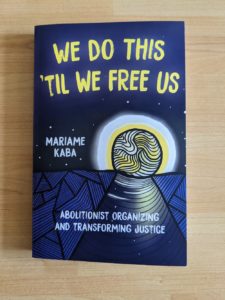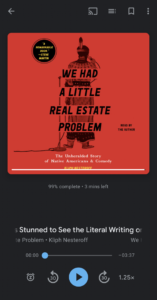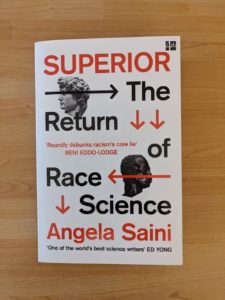 Four Stars
Four Stars
Best for:
Those interested in learning more about an abolitionist approach to justice.
In a nutshell:
Author and organizer Mariame Kaba shares a collection of essays and interviews she has written over the years on the concept of police, prison, and surveillance abolition.
Worth quoting:
“History is instructive, not because it offers us a blueprint for how to act in the present, but because it can help us ask better questions for the future.”
“Prison is not feminist.”
“The problem with casting militarization as the problem is that the formulation suggests it is the excess against which we must rally.”
Why I chose it:
I’ve followed Kaba on Twitter (known as @PrisonCulture) for a few years, and was excited to read more of her writing in a longer form.
Review:
I grew up in a well-off, mostly white, suburban town. My only interaction with the criminal punishment system was the regular visit from D.A.R.E. officers during elementary school, and being pulled over a couple of times. In college, I once requested assistance from the police after a break-in of my boyfriend’s car where my bag was stolen; the officers I dealt with were sexist jerks. I studied society and justice as an undergraduate, took a course in policing, and even thought I would become an attorney one day.
I also recall the beating of Rodney King as my first awareness that maybe the police, and criminal punishment system (I haven’t referred to it as the criminal justice system once I read criminal punishment used as a term by someone I unfortunately can’t recall) possibly failing to hold police to account. And now I am someone who thinks the entire system needs to be torn down and rebuilt based on different values.
I didn’t get here overnight, I still at times have trouble articulating my thoughts on these issues, and I still have so much to learn, but books like this one help me solidify my values and my approach to things. I think a lot of white people who chose to become more involved in actions to protest and defund the police in the US after George Floyd’s murder are still not comfortable with the idea of removing the police from communities. Kaba I think hits the nail on the head in this book, where in one essay when asked about how can we imagine a world without police, she points out that this is actually the reality for so many white communities. The police don’t harass us in the ways they harass and terrorize people of color in communities where they are the majority. White people are mostly raised to think that we can call on the police when something really awful happens to us, and the police will help.
But at what cost?
Kaba spends a good amount of time in this collection talking about accountability vs punishment. A few of the essays are framed around Me Too and stories of sexual assault. She touches directly on how so many have clamored for people like R. Kelly and Harvey Weinstein to be abandoned in prison for life. That this seems right and fair to us, especially to women who may have experienced such violations. But she points out that this isn’t consistent with the ideas of abolition. That we can’t just say its fine to abandon some people because we specifically feel like their crime is really bad. Because what comes from that? How does that heal the harm caused? How is prison any sort of accountability for harm caused? Is that justice, really?
Since starting to come to my view that reform is insufficient and ultimately could be harmful, and that abolition is the approach I support and the one that aligns most with my values, what I’ve struggled most with is that I want an alternative to be presented to me, fully formed. I want to be able to point to X idea and say that will definitely work, and that is exactly what we should replace our current criminal punishment system with. But Kaba’s writing has helped me to be more comfortable with the idea that it’s the community that needs to come together to decide how we want our values to come out when someone is harmed. The fact that the current system is vile is enough to make it right and good that we tear it down and try something else. The current system is ALREADY failing, so what abolitionists in communities across the US are trying out can only be better.
I am so new to this way of thinking (LOL at the people who claim we all get more conservative as we age), and I know others are too. I think this is an excellent book for anyone who is interested in police reform, defunding the police, prison abolition, to pick up. Everyone reading isn’t going to agree with everything Kaba shares, but the way she shares it, and her reasoning? It’s worth reading, taking in, and sitting with.
Keep it / Pass to a Friend / Donate it / Toss it:
Keep it and Pass to a Friend





